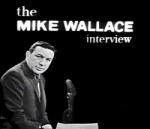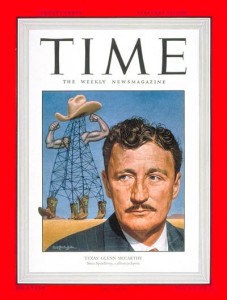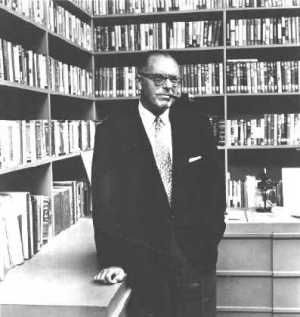
There’s an interesting new page on the Harry Ransom Center (University of Texas) site: a collection of full episodes of The Mike Wallace Interview show. You can watch something like sixty interviews Wallace conducted in 1957 and 1958. The interviewees are various newsmakers including Gloria Swanson, Aldous Huxley, Salvadore Dali, Frank Lloyd Wright, Margaret Sanger, Jean Seberg, Erich Fromm, Eleanor Roosevelt, Anthony Perkins, Henry Kissinger, and stripper Lili St. Cyr (“Lili St. Cyr, America’s leading strip teaser, talks to Wallace about her attitude towards the men who come see her perform, her attitude towards her profession, show business, and flying saucers”).
I watched two today. The first one was publisher/panel show quipster Bennett Cerf. Ever since I saw copies of his humor books lying around my father’s bookstore when I was a child, I’ve always had a sort of fascination with Cerf. He should be remembered as the president and driving force of Random House and an important and powerful voice against censorship, but he is probably best known to the public as the erudite but corny panelist on What’s My Line.
This was, I believe, Mike Wallace’s first regular gig on national television, and, I have to say … he comes off as kind of a sensationalistic bully who repeatedly baits his guests and is relentlessly abrasive. This shouldn’t come as a surprise to anyone who has grown up watching him on 60 Minutes, but the attack-dog persona wasn’t a comfortable fit yet — it’s a bit forced. Here is the intro to the Cerf interview:
WALLACE: Good evening, my guest tonight lives a double life. He’s a well-known figure in two controversial fields, television and book publishing. His name is Bennett Cerf. Bennett, in a moment I shall ask you what you think is wrong with television. And I shall confront you with a charge that book publishers are wantonly exposing young readers to obscene trash. My name is Mike Wallace, the cigarette is Philip Morris.
(As you can tell from that last line, Philip Morris cigarettes might as well be the third person on that black set. Wallace continuously shills for the cigarette-maker throughout the show, and at times it’s difficult to see the person being interviewed through the cloud of smoke.) (By the way, I’m not sure which is more destructive to Youth and to Society: “obscene trash” like Peyton Place or a 2-pack a day cigarette habit.)
Sometimes he just asks stupid questions:
WALLACE: Well now, tell me this: You talk about the American urge toward independent thought; can you tell me one single independent thought expressed on ‘What’s My Line’ in the past seven years?
CERF: Good Lord! That’s not the kind of show it is. Er… it’s a pleasant show. I think it owes its success to the fact that we have a pleasant group. I think John Daly does a superb job as moderator….
(And, later, of course, Wallace lets his bully shield down and plays good cop, telling him how much he and his family enjoy watching the show — presumably whilst filling up ashtray after ashtray in the living room of the Wallace homestead.)
The second show I watched was an interview with a Texas oilman I’m embarrassed to say I knew nothing about, other than his name (and that, only vaguely): Glenn McCarthy. He grew up relatively poor, but by the time he was 26 he was a millionaire wildcatter. In 1949 he was worth over 200 million dollars, but by 1952 he was 52 million dollars in debt. (He bounced back.) It is widely believed that the character of Jett Rink in Giant was based on him.

The oil industry is full of interesting and eccentric people, and Glenn McCarthy seems to have been one himself. Wallace leeringly asks the dark glasses-wearing, slow-talking, almost somber McCarthy to regale the audience with tales of his fighting and gambling. McCarthy insists that he doesn’t like to fight, but nevertheless tells about a fight (with a bottle of lye) that might (or might not have) blinded and scarred a man. Wallace brings the whole Texas millionaire oilman stereotype full-circle when he actually asks McCarthy how much money he has RIGHT NOW in his wallet (this is Mike Wallace, mind you, not Joan Rivers). (For the completists, McCarthy had about $1200 or $1300.)
My favorite over-the-top moment in this show was Wallace paraphrasing the Bible:
WALLACE: I quote from Christ’s Sermon on the Mount, and I’ve condensed the passage somewhat. Christ says, “Lay not up for yourselves treasures upon earth, for where your treasure is there will your heart be also. No man can serve two masters; you cannot serve God and Man.” [pause] Do you think Christ was wrong?
“Do you think Christ was wrong?”
I’m not really sure why Mike Wallace is considered such a great interviewer.
Still, I’m interested in this period, and it’s nice to see these people being interviewed. It’s wonderful that the HRC has posted these shows online, but dear GOD, Harry Ransom Center … find people who can actually TRANSCRIBE! Just in the two shows I watched (which are, unfortunately, saddled with subtitles) I saw an embarrassing number of typos and misspellings and just crazy “transcriptions” (“H.L. Hunt” was transcribed as “Joe Hunt” and the phrase “book publishers are wantonly exposing young readers…” from the Cerf program was transcibed as “book publishers are waterily exposing young readers…” — just because you don’t know what the word is doesn’t mean you can just MAKE ONE UP! – “waterily”?!). I don’t know who is responsible for these transcriptions, but they need a stern talking-to.
Hey, Ransom Center — you seem to be in dire need of a proofreader … I’m available!
Next up: Elsa Maxwell (“syndicated gossip columnist and professional party hostess, talks to Wallace about Elvis Presley, Nikita Kruschev, Jane [sic] Mansfield, alcohol, society, immorality, The Duchess of Windsor, Cleveland Amory, and Greta Garbo”) — I’ve seen several clips of her on, I think, Jack Paar, and she was amusing. Also, I’m curious to see Mary Margaret McBride (who I don’t know much about other than her name, but I feel I need to learn more about the “First Lady of Radio” who “pioneered radio journalism with more than 30,000 interviews over more than 20 years”).
Anyway … check them out.






